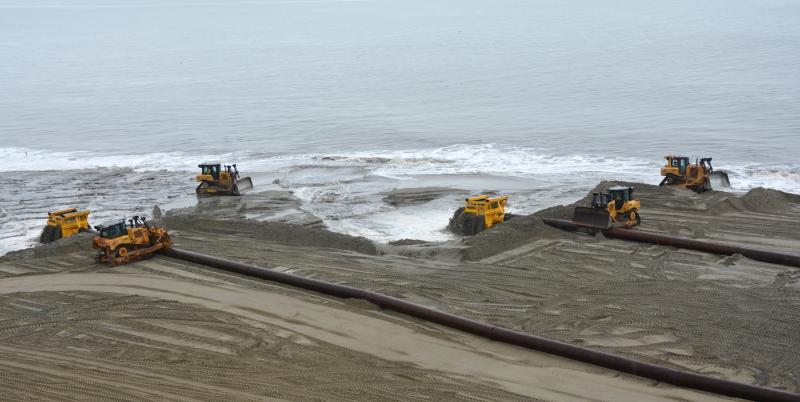Report: ocean, bay towns should contribute to beach replenishment
A state-funded economic analysis for shoreline management recommends ocean and bay communities pay 50% to 75% of the costs associated with beach replenishment projects that can cost tens of millions.
The Delaware Department of Natural Resources and Environmental Control announced it was conducting the study in January. At the time, officials said if no changes were made in the revenue collection method for beach replenishment projects across the state, the fund supporting those projects will run out of money in five years.
The majority of benefits of the projects are experienced locally, said the report, which was presented during a meeting Sept. 28.
Bay and ocean beach replenishment projects have taken place in Delaware since the 1950s. Between the two, there have been nearly 25 million cubic yards of sand pumped onto the beaches.
Under the current operating system, the federal government pays for 65% of the projects, with the state picking up the rest. In the past 20 years, the replenishment projects have cost about $210 million, with $68.1 million coming from the state.
The state funds its portion of beach replenishment two ways: using 1% of the state’s 8% lodging tax and through Bond Bill appropriations by the General Assembly.
To continue to fund the state’s 35%, the report recommends Delaware Bay beach communities – Bowers, Broadkill, Cape Shores in Lewes, Kitts Hummock, Pickering, Slaughter, South Bowers – pay 52% to 75% of that cost, with the state picking up the rest.
The same report recommends Atlantic Ocean beach communities – Rehoboth Beach/Dewey Beach, Bethany/South Bethany, Fenwick Island, Lewes – pay 53% to 71%, with the county picking up 16% to 31% and the state picking up 11% to 19%.
Dewey Beach Mayor Bill Stevens doesn’t think his town should pay for any replenishment costs.
“DNREC has always maintained that the beaches are theirs and we are merely overseeing them, so the idea that we will be responsible for a portion of the cost is asinine,” said Stevens. “I sincerely do not think any contribution is justified with the amount of revenue our towns generate for the state.”
Rehoboth Beach Mayor Stan Mills agreed.
“There is no local municipal contribution, and it should stay that way,” he said.
Mills said he has concerns about the financial impact on towns. None have deep pockets or line items in current budgets for beach nourishment projects, he said.
“Considering the monies that beach towns expend to maintain our beaches and including the monies we expend with expanded police, beach patrols, public works personnel to accommodate increased summer populations, while considering that the state is the main benefactor of the contributions of the coastal economies, the state should continue to shoulder its portion of nourishment project costs without municipal input,” said Mills, who is a member of a working group established to participate in the study.
The working group includes representatives from DNREC, Bay Beach Association, Association of Coastal Towns, Delaware Sea Grant and others.
Mills said a recent ACT-sponsored study by Delaware Sea Grant valued the contribution of the coastal economy to the state at more than $10 billion. Since the state is the main benefactor, the state should be shouldering the entire state’s portion of nourishment funding, he said.
Michael Globetti, DNREC spokesperson, said the department is not suggesting these numbers be implemented. Additionally, he said, this study does not discuss or prescribe how communities would actually pay if something similar to this project is implemented.
The upcoming gubernatorial election may also play a part in how the process plays out because it’s likely there will be a new DNREC secretary.
Stevens said it would make the most sense to have the replenishment and dredging decisions spearheaded by the next leaders.
Adding to the unknowns is a possible change in the larger federal/state funding formula.
Stevens said Sen. Tom Carper has indicated that in the proposed 2024 Water Resources Development Act, the cost share for all beaches in the Delaware Coastal Beach System would be 80% federal, 20% non-federal.
Rachel Skaar, spokesperson for Carper, and Globetti both confirmed the possible change to the federal legislation. However, it’s unknown exactly when the newest version of WRDA would take effect.
The next steps in the process call for a working group to discuss the report, with a final report being made publicly available in late 2024 and presentation to DNREC leadership in early 2025.
Chris Flood has been working for the Cape Gazette since early 2014. He currently covers Rehoboth Beach and Henlopen Acres, but has also covered Dewey Beach and the state government. He covers environmental stories, business stories and random stories on subjects he finds interesting, and he also writes a column called Choppin’ Wood that runs every other week. He’s a graduate of the University of Maine and the Landing School of Boat Building & Design.
























































